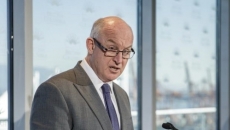Experts say social media is emerging as a key battleground in the Russia-Ukraine conflict, warning that Canadians should be on the lookout for digital deceptions and propaganda.
Ukrainian-Canadian journalist and researcher Jane Lytvynenko says the internet has been flooded with confusing and misleading information about how the Russian attack on Ukraine is unfolding.
The senior research fellow at Harvard University's Shorenstein Center on Media, Politics and Public Policy says some of this uncertainty stems from the challenges of tracking a fast-changing situation on social media.
Lytvynenko says social media has served as a vital platform for sharing the realities of what's happening on the ground, but the online fog of war has been thickened by deliberate attempts to spread disinformation.
U.S. authorities have accused Moscow of engaging in a disinformation campaign including a plot to produce a propaganda video showing a fake Ukrainian attack to create a pretext for Russian military action against its neighbour.
Jeffrey Dvorkin, former head of the University of Toronto's journalism program, says media organizations and the public should apply a critical eye to social media posts about the conflict, and tech companies need to shore up their systems to stop misinformation from spreading on their platforms.
The head of security policy at Meta, which owns Facebook and Instagram, tweeted on Thursday that the company has established a special operations centre staffed by experts, including native speakers, to monitor and respond to the conflict.
Twitter Canada spokesman Cam Gordon says the company is looking out for potential risks related to the crisis, including "identifying and disrupting attempts to amplify false and misleading information and to advance the speed and scale of our enforcement."






